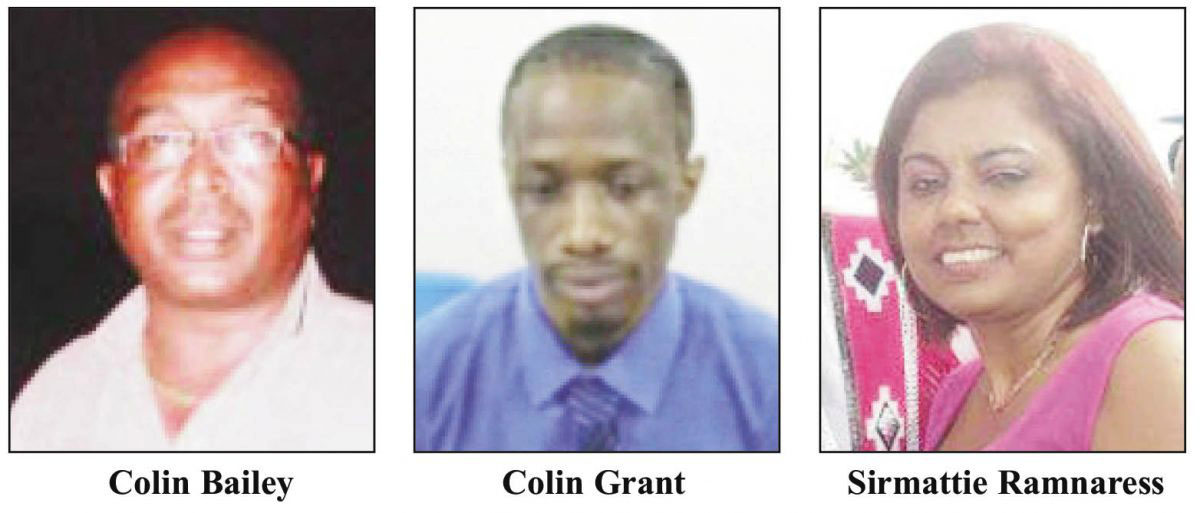Former Police Sergeant Colin Bailey, who was acquitted on a charge of murdering his wife, is suing the state for more than $100 million in damages over his wrongful arrest and subsequent detention for five and half years.
Bailey was freed in October after Justice Jo-Ann Barlow upheld a no-case submission made on his behalf by attorney Nigel Hughes, following the admission by the prosecution that there was no evidence linking him to the crime.
The Attorney General (AG) and the Director of Public Prosecutions (DPP) have been named as respondents in the action.
In his statement of claim, which has been seen by Stabroek News, Bailey is seeking several declarations, the award of damages in excess of $100 million and exemplary damages. Among the declarations being sought is that his arrest and detention were in violation of his constitutional right to liberty; that his detention for five and a half years breached his constitutional right to liberty and a fair trial within a reasonable time; and that his detention at the Lusignan Prison without basic medical facilities to prevent the spread of COVID-19 breached his constitutional right to protection from inhuman and degrading treatment. As a result, he is, among other things, seeking damages for wrong arrest and detention, wrongful and malicious prosecution, breach of his right to protection from cruel and degrading treatment, and breach of judges’ orders that he be tried urgently.
According to the particulars for exemplary damages included in the claim, Bailey was charged on February 24, 2016, committed to stand trial on November 22, 2016, but only faced a judge and jury in October this year. He was freed on the second day of the trial. It was noted that while his case was listed for every one of the assizes between the time of his committal and when he finally went to trial, the DPP had failed to present the indictment against him or scheduled the indictment for trial before judges who had been recused from hearing the case. Additionally, the action cites the DPP for failing to comply with the orders of two judges directing that the indictment be presented at specific times, and for his continued incarceration for five and a half years although there was no legal basis for the institution of the charge.
The observations of Justice Barlow were also highlighted, including that Bailey’s was a case where the body tasked with ensuring that a person is only before the court if there is evidence linking him to the commission of the offence “did not thoroughly peruse the material.” The judge had also drawn attention to a similar case in another county. “The Court’s plea to the prosecutorial arm of the State is to examine the material if you have anything to do with the initial charge. No charge should be instituted where there is no evidence. Examine the committal record, examine all other relevant material carefully and fulfil the constitutional mandate that “no one should be before the court unless there is some lawful reason for that person to be there….” Every civilised society must have a system that ensures that for its citizens that measure of security, that measure that says you will not be before the court if there is no evidence,” she said.
Bailey also reported that he lost over $8 million in income during his incarceration.
Bailey’s common-law wife, businesswoman Sirmattie Ramnaress, 36, had been found dead on the morning of August 31, 2013 on the garage floor of her Diamond, East Bank Demerara home, with a stab wound and injuries to her head and body. An autopsy later determined that she died from cerebral haemorrhage as a result of blunt cranial trauma, compounded by fractured spine.
In November 2015, her neighbor, Colin Grant, was charged with the woman’s murder after police, being in receipt of information, were led to Grant, who was found in possession of the deceased’s laptop which had her initials engraved on the battery. Grant then reportedly led the police to Ramnaress’ 11-point diamond ring, which he had presented to his girlfriend.
Close to three years after the murder, police informed Bailey that having conducted their investigations and received advice from the DPP, he would be charged.
A jury for the trial of Bailey and his then co-accused Grant was empaneled for commencement on October 12 this year. Before the matter started, however, Grant indicated to the Court through his attorney that he wanted to plead to the lesser offence of manslaughter. He subsequently accepted that he had unlawfully killed the businesswoman.
In her comments prior to acquitting Bailey, Justice Barlow had cautioned that the Chambers of the DPP must ensure that cases satisfy the threshold needed before being brought to court; even as she noted that in the absence of even an iota of evidence, Bailey should not have been before the court.
The judge, rhetorically questioned why it was that the accused was before her and the charge levelled against him when no link was established between him and the offence.
Justice Barlow said that apart from wasting judicial time, bringing such a case for trial before a jury gives the public “false hope” that the prosecution even has a case, when that is not so.
During the course of the investigations, Bailey had continuously urged police to look beyond him as he suggested their misdirected focus was allowing the killers to go free.






